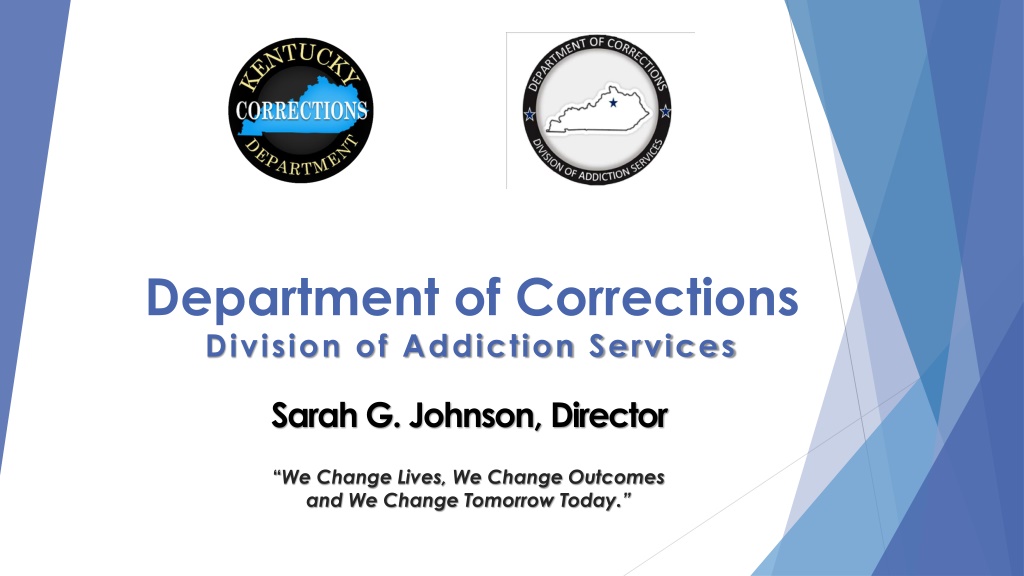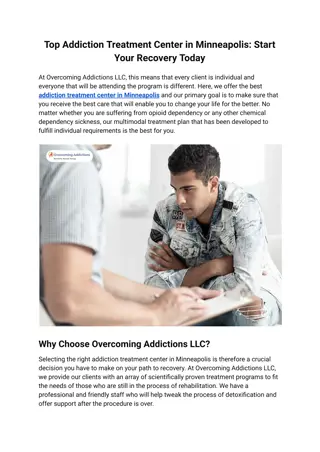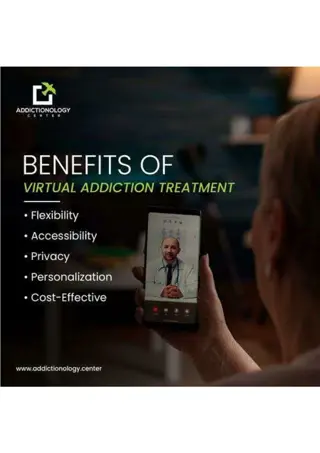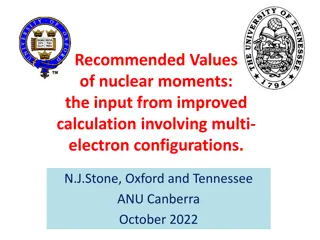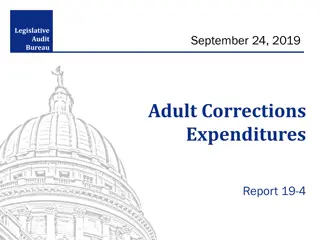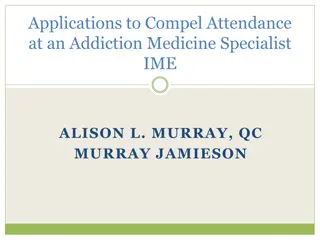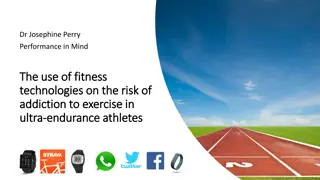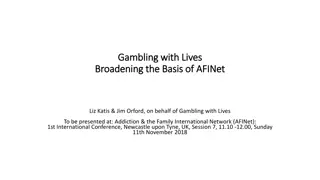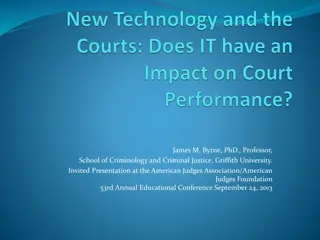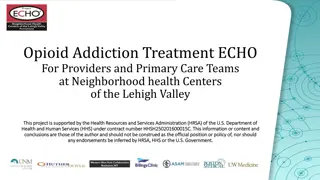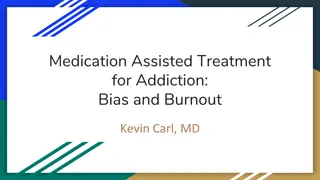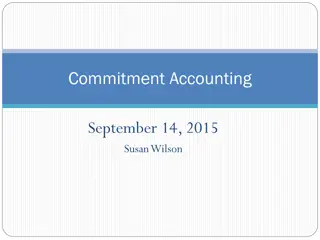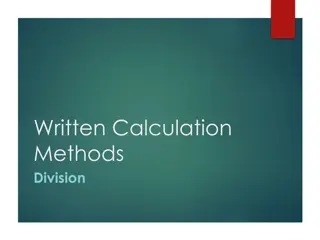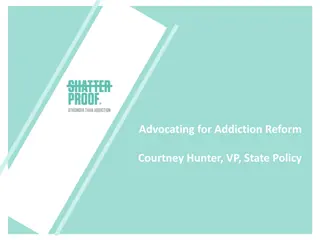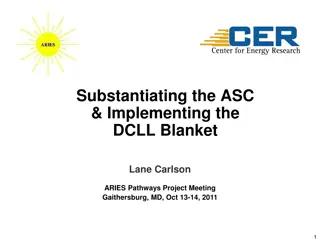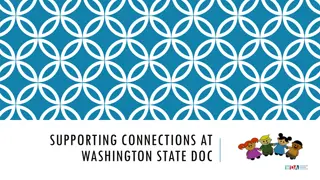Department of Corrections Division of Addiction Services Organizational Overview
The Department of Corrections Division of Addiction Services, led by Director Sarah G. Johnson, is committed to changing lives and outcomes through their organizational structure. The division is divided into regions managed by experienced professionals, ensuring effective programs and services are provided across various areas. With a dedicated staff of over a hundred, the division focuses on community and institution support, under the leadership of its Director and Assistant Director.
- Department of Corrections
- Addiction Services
- Organizational Structure
- Staff Management
- Community Support
Download Presentation

Please find below an Image/Link to download the presentation.
The content on the website is provided AS IS for your information and personal use only. It may not be sold, licensed, or shared on other websites without obtaining consent from the author. Download presentation by click this link. If you encounter any issues during the download, it is possible that the publisher has removed the file from their server.
E N D
Presentation Transcript
Department of Corrections Division of Addiction Services Sarah G. Johnson, Director We Change Lives, We Change Outcomes and We Change Tomorrow Today.
Division of Addiction Services Organizational Chart DOC Commissioner Deputy Commissioner Community Programs Director of Addiction Services Assistant Director of Addiction Services Executive Staff Advisor Branch Managers Central Office Administrative Specialists Community SSCs Program Administrators Institution Administrative Specialist Institution SSCs
Addiction Services Division Regions Maryann Strickland North Central Region Branch Manager Louisville Region Sarah G. Johnson Director Jeannie Waldridge Assistant Director North Central Region North East Region BOONE South East Region GALLATIN BRACKEN PENDELTON GRANT MASON CARROLL GREENUP South Central Region LEWIS Mylea McFelea Louisville Region Branch Manager TRIMBLE ROBERTSON OWEN HARRISON BOYD FLEMING HENRY CARTER South West Region OLDHAM NICHOLAS Ashley Short Executive Staff Advisor SCOTT ROWAN BOURBON Jay Volkert North East Region Branch Manager FRANKLIN Erin Kron-Chia North West Region Branch Manager SHELBY ELLIOTT BATH North West Region JEFFERSON LAWRENCE WOODFORD FAYETTE MONTGOMERY CLARK SPENCER ANDERSON MORGAN MENIFEE JOHNSON BULLITT MARTIN MEADE POWELL JESSAMINE WOLFE HANCOCK MERCER MAGOFFIN NELSON MADISON WASHINGTON BRECKINRIDGE ESTILL HENDERSON FLOYD HARDIN DAVIESS LEE GARRARD BOYLE PIKE BREATHITT UNION MARION LARUE OWSLEY LINCOLN JACKSON WEBSTER MCLEAN KNOTT GRAYSON OHIO PERRY ROCKASTLE TAYLOR CASEY CRITTENDEN HART HOPKINS CLAY LETCHER GREEN BUTLER LESLIE EDMONSON LAUREL Denise Thorpe Special Detailed South East Region Branch Manager MUHLENBERG PULASKI LIVINGSTON CALDWELL ADAIR RUSSELL BALLARD Hillery Ohnemus South West Region Branch Manager WARREN METCALFE BARREN LYON McCRACKEN HARLAN KNOX CHRISTIAN WAYNE MARSHALL WHITLEY LOGAN CUMBERLAND CARLISLE TODD BELL MCCREARY TRIGG ALLEN CLINTON MONROE SIMPSON GRAVES HICKMAN CALLOWAY FULTON Veronica Hunt South Central Region Branch Manager
Division of Addiction Services Staff Position Director Total 1 1 1 8 7 13 23 48 102 Assistant Director Executive Staff Director Administrative Staff Branch Managers Program Administrators Institution SSCs Community SSCs Total Staff
Current DOC Treatment Options Program Type Sum of Beds Intensive Outpatient Program (IOP) 1,460 Re-entry Services Center (RSC) 1,211 Jail 1,635 Prison SAP 903 Private Prison 112 Recovery Kentucky Centers (RKC) 840 Grand Total 6,161 Current as of June 2020
Substance Abuse Program-SAP A 6 month evidence-based Substance Use Disorder treatment Therapeutic Community Model which includes but not limited to: o Prosocial behaviors and attitudes; o Trial and error learning process; o Supported and guided by the community and staff; o New behaviors and attitudes o Accountability o Clear expectations; o Curriculum- Hazelden New Directions Workbook Series (Intro to Treatment, Criminal & Addictive Thinking, Drug & Alcohol Drug Education, Socialization, Co-Occurring Disorders, Relapse Prevention, and Preparing For Release.) Locations BCC, GRCC, KCIW, KSR, LAC, LSCC, NTC, RCC, WKCC, and Ross Cash Boyle County Detention Center (M), Breckinridge County Detention Center (M), Bullitt County Detention Center (M), Christian County Detention Center (M), Daviess County Detention Center (M), Fayette County Detention Center (M/F), Fulton County Detention Center (M), Grant County Detention Center (M/F), Grayson County Detention Center (M), Harlan County Detention Center (M), Hardin County Detention Center (M/F), Henderson County Detention Center (M/F), Hopkins County Jail (M), Kenton County Detention Center (M), Laurel County Detention Center (M), Three Forks Regional Jail (M), Marion County Detention Center (M/F), Mason County Jail (M), Pike County Detention Center (M/F), Powell County Detention Center (M), Shelby County Detention Center (M)
Substance Abuse Program Mentor SAP Mentor An evidence-based ongoing Substance Use Disorder treatment 6 month in length Therapeutic Community Model which includes but not limited to: Model prosocial behaviors and attitudes; o Model success or failure o Model support and guidance o Model new behaviors and attitudes o Model appropriate accountability o Model leadership o Hazelden Now That You re Sober book work o Program Location: BCC, GRCC, KCIW, KSR, LAC, LSCC, NTC, RCC, WKCC, and Ross Cash Boyle County Detention Center (M), Breckinridge County Detention Center (M), Bullitt County Detention Center (M), Christian County Detention Center (M), Daviess County Detention Center (M), Fayette County Detention Center (M/F), Fulton County Detention Center (M), Grant County Detention Center (M/F), Grayson County Detention Center (M), Harlan County Detention Center (M), Hardin County Detention Center (M/F), Henderson County Detention Center (M/F), Hopkins County Jail (M), Kenton County Detention Center (M), Laurel County Detention Center (M), Three Forks Regional Jail (M), Marion County Detention Center (M/F), Mason County Jail (M), Pike County Detention Center (M/F), Powell County Detention Center (M), Shelby County Detention Center (M)
Outpatient Substance Abuse Treatment Programs Evidence-based Substance Use Disorder Treatment for individuals assessed for lower level of care. Modified SAP with less programming hours. The primary curriculum for all programs is the Hazelden New Direction Series. Evidence-based interventions such as Cognitive Behavior Therapy, 12 step facilitation, Social Skills Training, Brief Intervention, and Relapse Prevention are also utilized. Clients receive individual and group counseling services, as well as drug and alcohol education throughout the duration of programming. Evidence- based activities and learning tools, such as role-plays and skits, are incorporated in the daily schedule. ProgramLocations KSR and Ross Cash Henderson County Detention Center
Co-occurring Disorder (COD) SAP Program Description Individuals with verifiable histories of Substance Use Disorder and Mental Health Disorders are eligible to receive an integrated treatment program to address both mental health and substance use disorders. Treatment is provided utilizing a modified therapeutic community model. Program Location KCIW and KSR
Co-occurring Disorder (COD) SAP Mentor Program Description Individuals who have completed COD SAP may participate in the mentoring program by serving as a mentor. Mentors serve as role models for participants and also complete tasks as assigned by the administrator. Mentors are chosen at the discretion of the program administrator. Mentors are engaged in activities and assignments designed to teach leadership. Program Location KCIW and KSR
SOAR Supporting Others in Active Recovery Program Description SOAR supports clients in their goal to stay safe and sober after completing SAP. SOAR is targeted toward on relapse prevention, education, and reentry skills/resources. Evidence-based curriculum from Hazelden called MORE (My Ongoing Recovery Experience). While enrolled in SOAR, clients are eligible to participate in up to two other reentry programs. Family communication and engagement. Location: NTC, Marion County Detention Center, coming soon Fulton Co Jail
SOAR Mentor SOAR Mentors demonstrate their leadership skills and assist with 6 month programming. SOAR Mentors expectations: o Model prosocial behaviors and attitudes o Model success or failure o Model support and guidance o Model new behaviors and attitudes o Model appropriate accountability o Model leadership to create clear and understandable expectations o Hazelden- Now That You re Sober book work o May participate in (2) other reentry evidence based programs Program Locations - NTC, Marion Co. Detention Center, and Coming Soon Fulton Co Jail
SAMAT- Supportive Assistance with Medications for Addiction Treatment SAMAT is focused on preventing overdose, relapse, and recidivism for individuals with Opioid Use Disorder and/or Alcohol Use Disorder whom have completed or are currently engaged in a Substance Abuse Program (SAP) through the implementation of FDA-approved medication for addiction treatment, which includes Vivitrol (naltrexone) and at some locations Sublocade. SAMAT candidates are identified and screened for eligibility approximately 2 months prior to their anticipated release from incarceration. SAMAT participants are provided medication services for up to 2 months before release from incarceration, which may include 2 injections. Program Locations: Vivitrol: All prisons, all jails that offer SAP Sublocade: NTC, BCC, KCIW and Kenton Co. Detention Center
PSAP- Pretrial Substance Abuse Program In response to Senate Bill 4, passed into law in 2009, individuals charged with Class C or D felony having no felony convictions within the past 10 years, may be eligible for treatment as an alternative to conviction. At initial incarceration, the Jail Pre- Trial Officer may alert the Division of Addiction Services Branch Manager or Program Administrator to conduct a clinical assessment to determine eligibility for SB4/PSAP. Upon an agreement between the judge, the commonwealth attorney, the client in question, and his/her attorney, successful completion of a jail based six-month treatment program may serve as an alternative to a felony conviction. Program Location: All jails that offer SAP for state inmates
County Inmate - SAP Substance Abuse Program offered for county inmates that is overseen and funded through the Department of Corrections. Utilizes evidence based curriculum and is similar to SAP for state inmates. Program Locations: Kenton Co. Detention Center & Louisville Metro Detention Center
Recovery Kentucky Center (RKC) Reentry Service Center (RSC) Community Long-term Residential SAP Program Description Recovery Kentucky Centers (RKCs): Through a joint effort by the Kentucky Department of Corrections, Kentucky Housing Corporation, and the Department for Local Government (DLG), Recovery Kentucky was created to assist Kentuckians recover from substance use disorders and to reduce homelessness. There are 14 Recovery Kentucky Centers across the Commonwealth. Each Center offers a total of 100 treatment/recovery beds, with 60 beds contracted by the Kentucky Department of Corrections in each location. As supportive housing projects, each center uses a recovery program model that includes peer support, daily living skills classes, job responsibilities, and establishes new behaviors. This type of supportive housing and recovery program is proven to help people who face the most complex challenges to live more stable, productive lives. Reentry Service Centers (RSCs): Those individuals in need of Substance Use Disorder treatment, who meet the classification criteria for community custody, may participate in programs available in reentry service centers approved by the department to offer Substance Use Disorder treatment programming.
RSC & RKC Mentor (SAP Mentor) Program Description Recovery Kentucky Centers (RKCs): Those individuals who have completed all the requirements up through Phase I at an RKC can apply and sign on to stay for Phase II/Peer Mentorship. They begin to give back to the community by acting as role models, mentors, and teachers to the other phases in the program. Reentry Service Centers (RSCs): Those individuals who have completed all the requirements for an RSC can apply to stay for Peer Mentorship. They begin to give back to the community by acting as role models, mentors, and teachers to the other phases in the program. Program Locations: All RSCs and RKCs
Recovery Kentucky Center (RKC) and Reentry Service Center (RSC) Community Long-term Residential SAP RSC Chrysalis House (F) CTS Russell Dismas Diersen (F) Dismas Owensboro (F) Healing Place for Women (F) Healing Place for Men Hope Center for Women (F) Jacob s House George Privett Center St. Ann s Westcare RKC Brighton Place (F) The Healing Place Campbellsville Center Point Cumberland Hope (F) Genesis Hickory Hill Liberty Place (F) MARC Morehead Inspiration Center Owensboro Regional Recovery SkyHope (F) Trilogy (F) WARM (F)
SAP-VOA (Volunteers of America) Program Description Opened 7-1-19, Volunteers of America Men s Halfway Back Program made available a new level of care to male clients on probation or parole. VOA s contract has been modified to allow for 45, 60, or 90 days of residential treatment. The treatment model is the same as the customary six-month residential treatment program, but the schedule has been modified to allow the client to complete earlier based on their individualized clinical progress. A Treatment Team is held weekly in partnership with VOA and DOC Division of Addiction Services staff to review clinical progress and determine who is appropriate for completion of the program. Time Frame This is a short-term 45, 60 or 90 days residential treatment program. Length of stay is based on level of care criteria and treatment team review. Location: VOA -Louisville
(IOP) Intensive Outpatient Program Community SAP Program Description Through an agreement with the Regional Community Mental Health Centers (CMHC), individuals who meet the clinical and classification criteria may attend a less restrictive 6-month Intensive Outpatient Program (IOP). Clients meet weekly in an outpatient setting to receive evidenced based substance use disorder curriculum. Clients must abide by all treatment program standards and submit to random drug screening. Because the majority of the clients reside in Louisville, Lexington, or Northern Kentucky, the department contracts with treatment agencies in these areas to provide Substance Use Disorder treatment services akin to those offered in the CMHC s. Eligible candidates include MRS, probationers, parolees, HIP, and pre-trial diversions. 6 months in length, individuals can be sent from an incarcerated setting to complete remaining treatment at these locations.
(IOP) Intensive Outpatient Program Community SAP Locations: Adanta Group Lifeskills New Vista Mountain Comp Seven Counties Northkey Communicare Pathways Comprehend PennyRoyal Cumberland River Valley Four Rivers Hope Center Kentucky River
Supportive Housing for Adaptive ReEntry Co-occurring Disorder & Serious Mental Illness SHARE CO & SHARE SMI SHARE CO SHARE SMI SHARE-CO is a facility for men with co-occurring Substance Use Disorders and Serious Mental Illness. The program addresses the substance use component by utilizing the peer-driven therapeutic community model that the Hope Center Men s and Women s Recovery Program has utilized for many years in its partnership with the Kentucky Department of Corrections. SHARE-CO utilizes Recovery Dynamics curriculum, integrating the 12 step model with the peer-driven therapeutic community model. Due to comorbid psychiatric conditions, individuals in the program require certain accommodations to ensure success. This includes supplementing the peer-driven therapeutic community model with licensed mental health professionals to provide direct services and support. It also maintains smaller therapeutic community groups, providing a personal format which allows both staff and clients to focus on the particular needs of this group. SHARE-CO is partnered with New Vista, a local community mental health provider, to provide onsite mental health counseling as well as referrals for outpatient psychiatric counseling as needed. Other accommodations include specialized mental health groups specific to integrating mental health with the 12 step model based Recovery Dynamics curriculum, while still affording clients the opportunity to integrate into classes with the Hope Center Men s Recovery Program to provide them with the full scope of the Hope Center s services. SHARE-SMI is a facility for men with Serious Mental Illness who may not meet criteria for any Substance Use Disorders. Clients receive onsite mental health screening and diagnostic services, psychoeducational and support groups focused on mental health management, and basic life skills groups. It provides onsite mental health counseling through a partnership with New Vista, a local community health provider, and it also has licensed mental health professionals to offer support services, crisis intervention, and assist with other immediate needs. SHARE-SMI also provides referrals for health care, job training, vocational support services, educational services, and permanent housing. Clients are given the opportunity to be referred for Targeted Case Management services to provide ongoing aftercare support once they transition back into the community.
Reentry Drug Supervision RDS Program Description The Reentry Drug Supervision Program (RDS) is a pilot program resulting from SB 120. The program seeks to restore lives and reduce recidivism rates of inmates and parolees suffering from substance use disorder. It consists of two phases lasting a minimum of 12 months or until sentence is completed. Phase one (1) participants will attend group therapy, reentry program team meetings, submit to random drug screens, obtain and maintain full time employment, training, or education, ensure payment of court obligations and supervision fees, indicate an appropriate understanding of recovery principles, attend self-help programs and obtain and maintain housing approved by the re-entry team. Phase two (2) participants will attend weekly meetings with the re-entry team and continue to submit to random drug screens. Location: Northern KY Length: 12-18 months
Substance Abuse Program Jails/Institutions AODE license Therapeutic Community Cognitive Behavioral Therapy Annual audits from OIG Annual audits for Addiction Services Evidence Based Curriculum through Hazelden Betty Ford RSC must become licensed to comply with new MA
Growth of Treatment Opportunities 7,000 5,901 5,951 5,901 5,764 6,000 5,664 5,488 5,455 5,000 4,000 3,424 3,000 2,289 2,000 1,590 1,000 - FY2010 FY2011 FY2012 FY2013 FY2014 FY2015 FY2016 FY2017 FY2018 FY2019 Current as of Nov. 2019
Womens Medical Release Released to Treatment 123 Refused 74 Completed Treatment 77 Completed WMR Supervision 29 Currently Active in Treatment 10 Violations of WMR 42
Changes in SAP Standardization Team meetings Updated New Directions Curriculum from Hazelden Co-Occurring Workbook Hazelden trained Addiction Services staff in November Training to our contracted partners
Why New Directions? Cognitive-Behavioral Therapy Program Hazelden Betty Ford & Minnesota COC Designed for Criminally Justice involved individuals Treatment for Criminal and Addictive Behavior Evidence Based Program Research shows it reduces all 3 recidivism measures: rearrests, reconviction, and reincarceration Received the highest rating against recidivism from the Council of State Governments It identifies, challenges, and replaces distorted thinking to change criminal and addictive behavior Utilizes therapeutic community, CBT, motivational interviewing, the trans theoretical model (stages of change), 12 step facilitation, Marlatt s model of relapse prevention, and milieu therapy. Minnesota DOC study shows 17% reduction for rearrests, 21% for reconviction, and 25% for reincarceration for a new crime
Substance Abuse Programs Added Fayette County Detention Center- 20 Beds Male & 20 Beds Female Hope Center- IOP- Fayette County 60 Treatment Slots VOA-Reentry Service Center- 45,60,or 90 day residential program The Men s Healing Place-60 Beds Blackburn Correction Complex- 50 Beds Southeast State Correctional Complex -100 Beds Coming Soon! Grant County Detention Center- 60 Beds (40 Male & 20 Female) Additional 40 beds Coming Soon! SHARE CO & SHARE SMI Fulton County SOAR 36 Beds-Coming Soon!
Other Services Provided Circuit Judges- Evaluation and treatment as a condition of supervision; Probation, Pretrial diversion, Shock probation, Misdemeanor convicted in circuit court District Judges- In some areas misdemeanor supervision SB133 Women s Medical Release P&P Office- Violation of supervision, violation of HIP, violation of MRS, graduated sanction, or Aftercare needs Parole Board- Substance abuse evaluation, SAP-IOP, long term residential (RKC/RSC), or Aftercare needs
Community SSC Assessment Total FY 19 18,317 Assessment Type Totals Parolees (27%) 4,873 Probationers (42%) 7,693 SAP Aftercare (9%) 1,676 ISC (2%) 393 Misdemeanant (3%) 473 Pre-trial Diversion (18%) 3,209
S S A A M M A A T T Supportive Assistance with Medications for Addiction Treatment Institutions- March 2016- 3 Vivitrol Injections prior to release Jails-July 2018- 2 Vivitrol Injections prior to release 90 Day Program Good Time Credit- 6 months Vivitrol -July 2018 Contracted RKCs & RSCs must allow Vivitrol Community SSC Vivitrol Referrals Revisions of SAMAT Protocol Program Administrator position established to oversee operations, provide quality assurance, and assist with protocols for other forms of MAT New data collection procedures
Justice Community Opioid Innovation Network JCOIN Cooperative agreement funded by NIH/NIDA Goal to improve capacity of Justice System response to OUD KY is 1 of 10 sites chosen Will focus on women in jails UK-CDAR, DOC, & BHID will work together to offer pretreatment and improve access to MAT Support will be provided by Voices of Hope 5 year grant - $8.8 Million
Studies/Evaluations University of Kentucky Center of Drug and Alcohol Research Criminal Justice Kentucky Treatment Outcome Study Change of Scope Incorporation of ASAMS, DSM-5 criteria for SUDs and common Co-Occurring Disorders Addition of Suicidality and overdose measures MAT Expansion Outcome Study New study to evaluate multiple forms of MAT
CJKTOS FY 2019 Among SAP graduates from KY jails, prisons, and community corrections facilities interviewed 12 months post-release 61.6% had not been re-incarcerated. 87.8% were living in stable housing. 76.6% were employed. 77.1% of those with children reported providing financial support to their children. 58.8% did not have a positive drug test in the year since release. 67.5% attended 12-Step meetings. 67.2% of those referred to aftercare, attended aftercare.
CJKTOS FY 2019 Of the SAP graduates who returned to DOC custody 100% were re-incarcerated on a technical or probation/parole violation, though 52.9% also had a new charge. 63.4% were employed, whereas 84.8% of non-recidivists were employed. 80.5% reported using drugs in the year since release and 56.9% had a positive drug test. Treatment graduates noted positives about SAP participation, including 81.5% felt better about themselves as a result of treatment. 81.9% received services they needed to get better. 83.1% considered the treatment program to be successful. Cost offset analysis indicated that For every $1 spent on Kentucky corrections-based substance abuse treatment there is a $3.94 cost offset.
Summary of Treatment Updates Standardizing Treatment Implementation of Assessment Tool for Level of Care- ASAMS Additional levels of care and alternative modalities of treatment Expansion of MAT Changes to policy and procedure New audit tool and CAP procedure Updated Curriculum- Addition of Co-occurring Referrals to non-contracted treatment programs Outcome Studies on New Initiatives
Addiction Services of Kentucky New Initiatives JCOIN-telehealth Changing the message- Treatment is not punishment Family & Community Engagement New Curriculum-Co-occurring New SMI/CO Program in the community Promoting Recovery instead of just Treatment New short term program in the community Reducing Stigma SOAR Aftercare in jails and prisons Expanding Programming Out-patient treatment at Henderson Co. Recovery is possible if you ASK for help!
